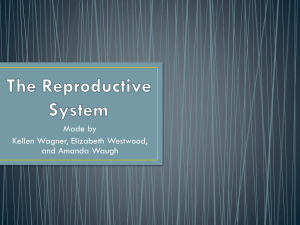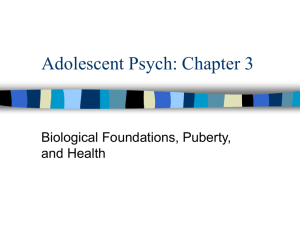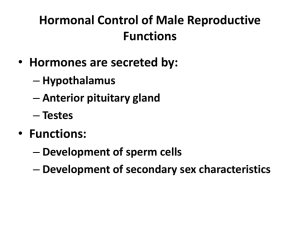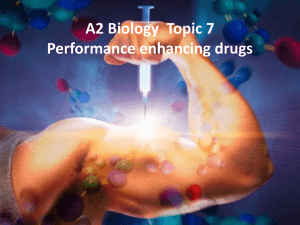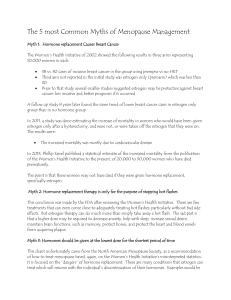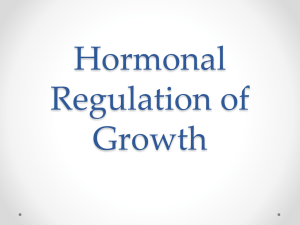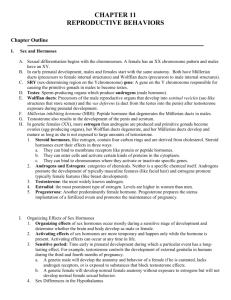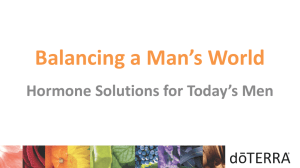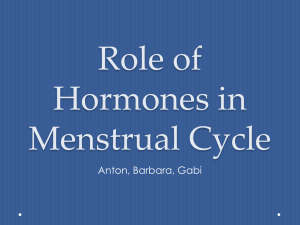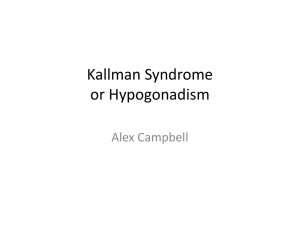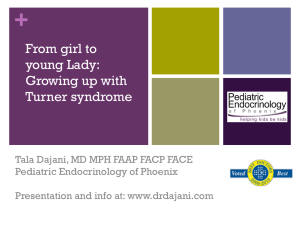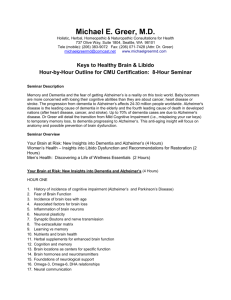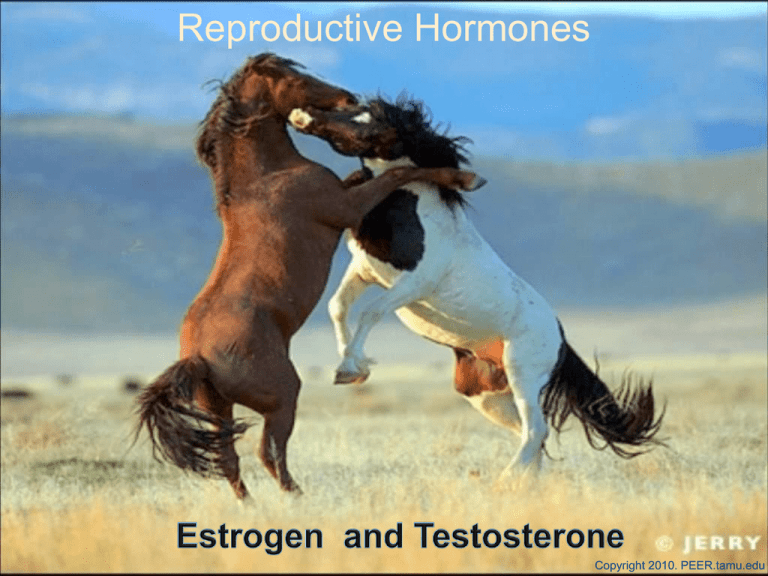
Reproductive Hormones
Copyright 2010. PEER.tamu.edu
A hormone is a chemical released into
the blood and transported to affect
cells in other parts of the body.
Hormones regulate many things
in the body, such as:
Growth and development.
Male and female development.
How the body uses energy.
Levels of salts and sugars in the blood.
The amount (volume) of fluid in the body.
Certain hormones play key
roles in reproduction.
They cause different sexual
characteristics in males and
females and control fertility
or the ability to have
offspring.
There are several
reproductive hormones but
the two major ones are
Estrogen and
Testosterone.
Puberty is the process of physical changes by which a
child's body becomes an adult body capable of
reproduction.
Puberty is initiated by hormone signals from the brain via
the pituitary gland to the ovaries of the females and testes
of the males. In response, these organs produce a variety
of hormones that stimulate the growth, function, or
transformation of brain, bones, muscle, skin, breasts, and
reproductive organs.
Growth accelerates in the first
half of puberty and stops at the
completion of puberty.
During puberty, major
differences develop in many
body structures and systems.
The most obvious of these are
referred to as secondary sex
characteristics.
Estrogen and Testosterone are
the hormones associated with
puberty.
Estrogens are hormones found in
females and in low levels in males.
These hormones control different
stages of the reproductive cycle in
females.
In females, estrogens control the
development of secondary sex
characteristics.
In males and females estrogen
promotes normal bone
development.
In females, estrogen is produced by
the ovaries.
How can you tell that these animals are females?
During the extensive studies of sex hormones in the
1920s, American biochemist, Edward Doisy, discovered
how to isolate and purify estrogens..
The Structure of Estrone
Compounds that have this basic 4-ring structure of
carbon atoms are called “steroids.” The side chains of
H and OH distinguish the different kinds of steroids.
C18H22O2
Compare the model to
the drawing and the
chemical formula. See if
you can identify the
corresponding parts.
In the model, the black
atoms are carbon, the
white atoms are
hydrogen, and the red
atoms are oxygen.
Five years later, German biochemist,
Adolf Butenandt, isolated
progesterone, another important sex
hormone, from the urine of pregnant
women.
Progesterone prepares the uterus for
pregnancy. A sudden fall in
progesterone is one of several
events that triggers labor.
C21H30O2
Butenandt won the Nobel Prize in 1939* for
demonstrating the structure of these steroids
and showing that all sex hormones were
steroids.
C18H24O2
Towards the end of his career, Butenandt also came very
close to isolating pheromones.
Hormones are released inside the body. Pheromones
are released outside the body to affect another
individual. In the following experiment, the type of
pheromone observed is a chemical that attracts mates.
Girls love me
for my
pheromones!
Butenandt extracted an oily substance from the
glands of 313,000 female silk moths, obtaining
about 5.25 mg of the substance.
When a glass rod was
dipped into the substance
and brought to a male silk
moth, an obvious attraction
was observed.
Why was the male attracted to the rod?*
Menopause occurs in older
women when the ovaries stop
producing estrogen, resulting in
a stopping of menstrual cycles
and loss of fertility.
Postmenopausal women receive
estrogen therapy to help prevent
bone loss and control symptoms
of menopause.
In this therapy, women are given
the estrogen their ovaries no
longer produce.
Hormone replacement therapy does more than
relieve symptoms of menopause.
It has been shown that bone fractures decrease by
50 – 70% and bone density increases by ~5%.
Also cardiovascular disease is less prevalent in
women who receive this therapy.
The most serious drawback of hormone replacement
therapy are blood clots.
Blood clots occur when blood thickens around an
injured area, such as a scab.
These can be dangerous if they occur in the
circulatory system because they can block blood flow.
Many people believe estrogen
therapy causes breast cancer.
In recent lawsuits, millions of
dollars have been won from
drug companies for selling
such estrogen.
Is this fair?
What if the patient and doctor
both wanted the treatment for
menopause and were informed
of the side effects?
What are hormones?
What are the two major reproductive hormones?
What are the functions of Estrogen?
What are some pros and cons of Estrogen
Replacement Therapy?
Testosterone, like estrogen, is also a steroid hormone. It is
found in males and in smaller amounts in females.
In males, testosterone controls the development of
secondary sex characteristics such as facial hair and
increased muscle mass.
Testosterone in males is produced by the testicles.
Compare and contrast the characteristics of these male
animals to the females you observed earlier.
Testosterone was purified by
Ernst Laqueur at the
University of Amsterdam in
1934 from bull reproductive
organs.
Testosterone was then isolated in 1935 by Karoly
David, E. Dingemanse, J. Freud and Ernst Laqueur.
Butenandt, who was also involved in estrogen research,
studied testosterone and chemically synthesized it and
worked out its chemical structure.
C19H28O2
These steroids are man made
derivatives of testosterone.
Users of anabolic steroids include
athletes and body builders, who use
it to stimulate the body to build
muscle tissue and strengthen bones
and speed muscle recovery
following exercise or injury.
Use of anabolic steroids is illegal
and extremely harmful.
Can you guess why they are
harmful?
Shrinking of the reproductive organs, reduced
sperm count, infertility. Why do you think this
happens?*
Cancer, jaundice, liver tumors and high blood
pressure are the more serious risks.
Aggression, acne, irritability, paranoia and
delusions can also occur.
If prostate cancer is present,
an increase of growth in
cancerous tumors will occur.
It can also cause an absence
of sperm, an excess of red
blood cells, and sleep apnea
(when breathing completely
stops during sleep).
A few men don’t have enough
testosterone.
Men with primary
hypogonadism or hormonal
decline are eligible for
treatment with testosterone.
Dangerous side effects are
still possible.
What is testosterone?
What are the functions of testosterone?
What are some of the side effects of anabolic
steroid usage?
Why do you think some people take anabolic
steroids even though they know about the side
effects?

